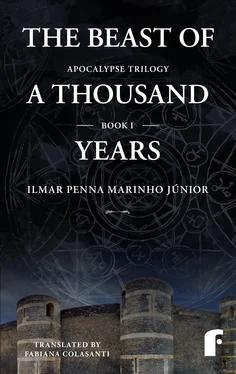“How’s your Buddhism, son? Have you been practicing?”
However, his father, maintaining his habits, didn’t wait for an answer. He apologized for having received higher orders to return immediately to Nancy. He sneaked a kiss on le petit’s cheek and left running, not waiting for the departure of the train. What was his father’s intention in creating a rapport with his Buddhist faith, after all? What was so weird about that? wondered Aurélien. He sensed that the silent goodbye was rooted in something personal, which unfortunately remained unacknowledged.
When the train departed, without his father’s presence, the only things left were the affectionate goodbyes of his grandparents and his mother, who was crying, sad, holding her handkerchief on the platform of the Strasbourg station, full of waits, people getting in and out, crowded with nervous voices. Amidst them, her last words stood out:
“Go and live life, mon petit.”
On the fast train ride, his father’s worried, pale face lingered in his thoughts for a good while and was projected on the window pane during the high-speed trip. Suddenly, the wistful image became fluid, gave way to the magnificent scenery of the flowering fields and productive plains of northeastern France. A clear sign that he had freed himself from the past, like a pressed champagne cork hitting the ceiling, and the hopes of a happy, fulfilled life as a librarian arose.
Aurélien Kléber was first on the public tender for librarian in Paris, thanks to his knowledge in computer science and History books. He was assigned to a mediathèque of the Ministry of Culture and Communications near Place des Voges. Thus, in the City of Lights, in addition to becoming an influential mediator between readers and books, he could choose to wander the Seine River or go to Notre-Dame Cathedral or Sainte-Chapelle and listen to their magnificent organ concerts. Possibilities that would open up for him in Paris, at only a good walk from his new work location. Little by little, Aurélien gained, inside, a growing conscience that life is a journey full of mysteries and surprises, connected to the great adventure of being in the world, that marked man’s evolution on Earth.
Chapter 7
AMELINHA, A DEAR FRIEND OF ANA’S, Leonardo’s wife, used to encourage her to consult with an astrologer she knew to discover the omens of her destiny.
“You have to go there, Ana. She’s wonderful! She knows how to restore hope in the midst of disillusions!”
But Ana kept postponing it and postponing it, and in the end quit the idea of going to see the astrologer, Lisa. Without telling his wife, it was Leonardo who ended up going to see the astrologer, because he felt haunted by the doubts about his involvement with the drug traffic.
After his father’s death, feeling less controlled in his life, Leo allowed himself to quit the law firm, which was imposed on him by his father, and commit exclusively to his occupation as an accountant and negotiator of the bribery connected to the drug traffic. He continued to expand his professional services to the organized crime, with no one ever finding out that, behind that cordial, low profile man who complained about urban violence, at the bottom of his heart there was a calculating Leo, thirsty for revenge. He’d never gone to a single favela to relay messages nor had he ever handled weapons or dealt drugs. He was happy to stay concealed in the background, in a minor role as an accessory, bestowed with the privilege of being the man of trust and the protégé of the thug Skull. But he expected a lot more from destiny and the mysterious “occult powers”.
Everyone recognized his competence and mathematical mind. Thus the nickname Big Head — as he was known in the criminal underworld. He became friends and performed small services for all the members of the gang. And, as if to prove that opposites attract, his closest friend was the boss’ “muscle”, the feared exterminator Runner, nicknamed with this nice sporting alias for his habit of entering the slums running and shooting to kill.
He was happy to be welcomed and called Mr. Leonardo. He thought the astrologer would refuse to open the door if she knew she had “Big Head” in front of her, although he had never been directly involved with drugs, larceny, robberies, and serial murders, typical of large urban concentrations. He would hate not to be allowed in the party of the stars or have his natal chart read like this: “Do you understand, Mr. Thug Helper, that you’re going down if you keep this double life as a criminal?” He laughed at the difficulty people have understanding that not every offender is a criminal. For the astrologer, the important thing was — whoever he might be — to not allow him to hinder the complicated reading of his solar progression.
“Do not interrupt me, please, or I won’t be able to read. Everything is in your favor. You’ll be rational and unemotional in order to achieve your goals, but first you’ll have to break connections with the past. There’s a vengeance here. It’s a double-edged sword. Be careful not to let everything go down the drain and ruin your life”
It was worth to be forewarned and not lose his mind with everything good that was yet to come — he told himself after the consultation, in which the woman of the stars picked from the past the deaths of his parents and warned him not to spoil his son too much. And she also told him, during the extra time of the consultation, several truths about his marriage of over fifteen years with Ana. However, what left him most sad and shaken was to remember his father’s death.
His head throbbed when he returned to the scene of the past. It was as if, all of a sudden, he’d heard the bang of that fatal shot in the den. He’d never forgotten that damned year. The shot was fired in the mahogany library. The upholstered couches, the valuable paintings, the lavish collection of secret books from the Inquisition, the beautiful china, the luxuriant ferns, everything was shaken by the deafening blast. There, death was inescapable — in the company of books and so many memories — disturbing the cozy place in which his father’s friends used to come to talk or sip a twelve-year-old whiskey, with the traditional five ice cubes.
When his mother opened the door, she was desperate with what she saw, unable to believe the classic suicide scene before her: his father’s head fallen on the blotter, blood still spilling on the table and dripping over the edges. A dark stain spreading through the silky Persian rug. His mother had burst into a convulsive cry, leaning on the back of the leather armchair, and soon began to yell hysterically. She just got silent when she was dragged from the library. Leonardo never forgot his mother’s petrified eyes and her last look of infinite affection toward his father’s lacerated head. His mother had named him Leonardo because she was very devoted to Saint Leonardo Murialdo, a saint nobody knew, but that she had heard Pope Paul VI pontificate as “excellent in the ordinary”. She never got over the suicide. She also suffered with the absence of her friends and the bad company of the white walls of the hospital, where she died months later, victim of an incurable cancer.
“How’s everything, sonny boy?” was the way his father always greeted him when he arrived at the landscaped manor on São Clemente Street.
He’d told the astrologer, when he scheduled the interview over the phone, that he was born on August 25, 1961, at 11 AM. Right on the day President Jânio Quadros renounced. It was a turbulent day for the country.
“How’s everything, sonny boy?” echoed the voice of nostalgia.
The dictatorship period was over and everything promised to go politically well, while economically everything was going bad. The first civil government elected after twenty years of repression had inherited the problems of the economic development model practiced by the military regime and worsened by successive international crises. On February 28, 1986, the government decreed Plano Cruzado, whose failed general price freeze and adoption of a “wage trigger” only contributed to an environment of economic recession, uncontrolled financial speculation and the threat of hyperinflation. Foreign exchange reserves were quickly exhausted and the confidence in the democratic country failed. Brazil went bankrupt.
Читать дальше












